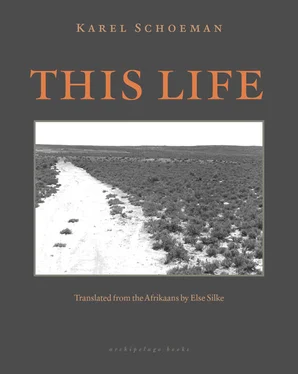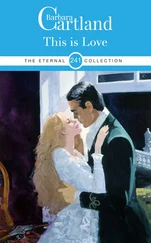Karel Schoeman - This Life
Здесь есть возможность читать онлайн «Karel Schoeman - This Life» весь текст электронной книги совершенно бесплатно (целиком полную версию без сокращений). В некоторых случаях можно слушать аудио, скачать через торрент в формате fb2 и присутствует краткое содержание. Год выпуска: 2015, ISBN: 2015, Издательство: Archipelago, Жанр: Современная проза, на английском языке. Описание произведения, (предисловие) а так же отзывы посетителей доступны на портале библиотеки ЛибКат.
- Название:This Life
- Автор:
- Издательство:Archipelago
- Жанр:
- Год:2015
- ISBN:978-0-914671-16-9
- Рейтинг книги:5 / 5. Голосов: 1
-
Избранное:Добавить в избранное
- Отзывы:
-
Ваша оценка:
- 100
- 1
- 2
- 3
- 4
- 5
This Life: краткое содержание, описание и аннотация
Предлагаем к чтению аннотацию, описание, краткое содержание или предисловие (зависит от того, что написал сам автор книги «This Life»). Если вы не нашли необходимую информацию о книге — напишите в комментариях, мы постараемся отыскать её.
considers both the past and future of the Afrikaner people through four generations of one family. In an elegiac narrator's tone, there is also a sense of compulsion in the narrator's attempts to understand the past and achieve reconciliation in the present. This Life is a powerful story partly of suffering and partly of reflection.
This Life — читать онлайн бесплатно полную книгу (весь текст) целиком
Ниже представлен текст книги, разбитый по страницам. Система сохранения места последней прочитанной страницы, позволяет с удобством читать онлайн бесплатно книгу «This Life», без необходимости каждый раз заново искать на чём Вы остановились. Поставьте закладку, и сможете в любой момент перейти на страницу, на которой закончили чтение.
Интервал:
Закладка:
The neighbours naturally devised plans to call on Stienie immediately, though they, too, were uncertain of what to expect. The visits were strained, with much left unspoken; this was true of answers as well as questions, and there was a great deal of feigned affection and goodwill on both sides. No doubt everyone was glad when the visit came to an end, and afterwards people gossiped more than ever, I presume, and made up for their uncertainty with speculation, suspicion and deduction. We went in to town for the next Nagmaal as usual, however, and attended all the services and Stienie received visitors and made calls as usual, though she was quieter than in the old days, with sudden moments of uncertainty and hesitation, and those restless, shining eyes were still noticeable. During the time she spent in Cape Town she had bought clothes on a grand scale and she wore those outfits to church now — well, it might have been what people wore in Cape Town but, as I have said, it was too stylish for our little town and our townspeople, and I always felt slightly self-conscious as I followed her to our pew, even though I might be considered the last person to accuse others of peculiarity. What bothered me, however, was that, unlike in the old days, she did not wear her expensive, elegant clothes because she found them beautiful and wanted to impress people; instead, her choice of clothing had become a kind of challenge, and as I followed her into church and sat beside her in the pew it was evident how nervous she was as she sat up so straight, glancing around with quick, bright eyes without noticing anyone. At New Year we entertained on the farm as usual, and more people arrived than in previous years, probably still out of curiosity, and I recall how Stienie moved among them all evening in her rustling red gown from Cape Town with its frills and lace trimmings, greeting and welcoming her guests tirelessly, and chattering without taking notice of anyone she addressed.
The nervousness remained, the restlessness remained; after her return she no longer seemed to fit into the position she had held among us before, and it was as if she were forever chasing after something new without knowing exactly what she desired. The hunger I had recognised years ago had only been stayed temporarily, and the restless craving of old had been reawakened. I watched and kept silent and waited, and in the new year she began to work blindly and tirelessly at the realisation of her dream: it was during the course of the next year that the new house was built and Maans went to Parliament, and it was during that time that she found Pieter a wife.
Where did it start — with the house? Yes, probably with the house. The homestead on the farm was old, of course, for it was probably nearly a hundred years ago that Oupa had built it, and it was old-fashioned, for in spite of all the alterations it still remained a house of its time with its dung floors in the bedrooms and kitchen, its sturdy walls, small windows and thatched roof, and our town house had always been more to Stienie’s liking with its wooden floors and large windows that let in the light. While Mother and I were living in town, Maans had the outbuildings demolished — the shed and kraal and outside rooms, together with the remains of the old homestead that Great-oupa had built — and had them rebuilt farther away from the house, and a room was added for Pieter; but, in spite of Stienie’s complaints, he seemed unwilling to go any further. Shortly after my return to the farm, he replaced the roof of our town house with corrugated iron, as people had begun doing, and that strengthened Stienie’s resolve to alter the homestead on the farm. The matter dragged on, however, until her illness occurred; but when she returned from the Boland she could not be stopped and Maans was forced to have a completely new house built with wooden floors and matchboard ceilings and sash windows and a tin roof, like the new houses she had seen in the Boland. At last Maans gave in, as he usually did sooner or later, and for months the builders were busy on the plain below the old homestead, beside the road and near the dams, while she watched them from the old house, more and more often giving the orders and instructions herself — and why not, for Maans was not really interested, and had other things to do, while Stienie knew exactly what she wanted. It was as if that protracted building process provided Stienie with a new goal in life after her return from the Boland, and equally important to her was the interest it aroused in our district, for as the news spread, people rode over to come and look. For Stienie it was a big thing to walk across with the women, though there was nothing but the extensive foundations to impress them with, and if there were no visitors, she was compelled to ask me to take a walk with her towards evening, and then we always made our way to the building site to see the walls going up. She was oblivious to the fact that I did not share her enthusiasm, nor take any real interest in the building: Stienie never paid much attention to what others thought or felt.
It was during this time, while she was busy with the new house, that Stienie decided Pieter should marry, for it was just then that Andreas Stofberg died. Andreas had always struggled on his farm and the drought had given him a hard knock, so that after his death the farm had to be sold to pay his debts. People expected Stienie to take care of his widow and young daughter, for she was their closest relative, and Maans seemed inclined to help, for he was fond of the little girl, but Stienie showed no particular inclination to take the woman in, not to mention her child. It was too much of an upheaval with the building, she declared, and in the end they went to live in an outside room of the town house, and Maans probably supported them, though Annie earned a little money with her sewing. After a while, before the new house had even been completed, Stienie remarked in passing one day that she wondered if it might not be a good thing for Oom Pieter to get married, and before I could recover from my astonishment, she went on to list all the advantages; she mentioned that he and Annie could live in the old homestead when we moved to the new house. She spoke rapidly without looking at me, but despite her concern about Oom Pieter, I knew that very little of what she was saying was the truth, for she just wanted to acquit herself of her obligation to Annie and get rid of Pieter before the house was completed, so that there would be no danger that they would spoil that new elegance with their presence, or that she might have to take in Annie and her child. Even so, even so, I thought, and did not know whether to laugh or cry; and at last I made no reply to her suggestion, for what would the point have been of voicing reservations? In the circumstances it was probably the best solution for everyone, even if it were conceived mainly to benefit Stienie. Annie was a decent young woman, quiet, neat and diligent, and she would look after him; and Pieter loved children and would accept her little girl in his life: the two of them would never have a true marriage, but he would be cared for, taste some security and warmth and, who knows, perhaps even something like love and happiness here at the end of his life. Thus they were married hastily before the magistrate in town one morning, almost as if it were something to be kept from people, with only Maans and Stienie and me as witnesses; Annie’s mourning period had only just passed and she was still wearing her black mourning dress. Pieter was almost sixty by then but during the few years they lived together, I deemed them to be happy, as far as I understood anything about happiness.
I did not know whether to laugh or cry, I have said, and I still do not know today. Actually, as I have said before, I never thought of the silent, good-natured, smiling old man in the outside room on the farm as my brother and, sitting together on the bench at the kitchen door of the town house that morning, I had made a final attempt to reach him and had been forced to turn away in the face of his implacable silence. There was no road leading back to the past, I realised, before me a wall of stones blocked my entry, and behind it in the distance lay the world of my youth, bathed in sunshine, untouchable but at the same time unreachable, with no connection between this smiling, patient old man in his shabby suit of clothes and the laughing youth with the pale naked shoulders on the sheaves, the youth hoisting himself soundlessly over the window-sill in the blinding moonlight. Why should I blame Stienie for pushing him out, as if I had not done it too, as if I had not been just as ready as she to forget about the poor and slightly neglected old man in the outside room?
Читать дальшеИнтервал:
Закладка:
Похожие книги на «This Life»
Представляем Вашему вниманию похожие книги на «This Life» списком для выбора. Мы отобрали схожую по названию и смыслу литературу в надежде предоставить читателям больше вариантов отыскать новые, интересные, ещё непрочитанные произведения.
Обсуждение, отзывы о книге «This Life» и просто собственные мнения читателей. Оставьте ваши комментарии, напишите, что Вы думаете о произведении, его смысле или главных героях. Укажите что конкретно понравилось, а что нет, и почему Вы так считаете.












